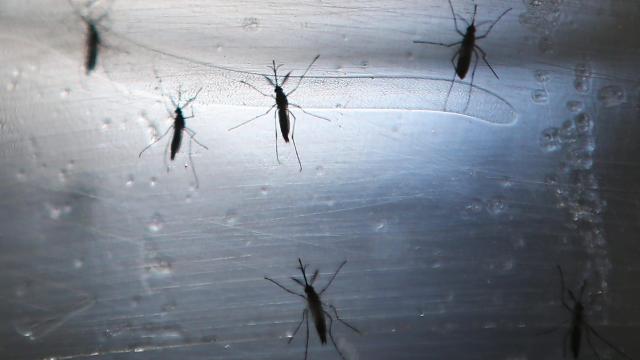Tens of thousands of male mosquitoes are descending on the Florida Keys. But these are no ordinary mosquitoes: They’re genetically modified, and they were planted around the state on purpose. It’s part of a plan to curb disease by releasing 1 billion mosquitoes across two states — but it’s giving some folks the heeby jeebies.
Workers placed boxes of mosquitoes’ eggs — two on Cudjoe Key, one on Ramrod Key and three on Vaca Key — on Thursday, and expect them to hatch in about a week. They’ll repeat the process over the coming months, releasing 12,000 of the bugs per week for 12 weeks. That’s 144,000 mosquitoes overall — gross.
The project marks the first time GMO mosquitoes have ever been released in the U.S., was launched by the Florida Keys Mosquito Control District (FKMCD) with the private British firm biotech Oxitec. It’s an attempt to curb the spread of dengue, Zika and yellow fever.
“As we are seeing development of resistance to some of our current control methods, we are in need of new tools to combat this mosquito,” Andrea Leal, executive director of the Florida Keys Mosquito District, said in a statement.
The idea is that the GMO mosquitoes will lower populations of Aedes aegypti, a type of mosquito species common in the Florida Keys that spread these insect-borne diseases. In the Keys, this variety makes up just 4% of the total mosquito population. But they caused 70 cases of dengue fever in Key Largo last year, and the risk of spreading other diseases is a huge concern.
Only the females of the Aedes aegypti species bite people for blood to mature their eggs. So scientists created GMO mosquitoes, which they call species OX5034, to produce female offspring which die off as larva. Oxitec, the company behind the GMO mosquitoes, and the FKMCD hope that the bugs will mate with female Aedes aegypti ones. Since the female offspring can’t survive long enough to reproduce, it will reduce the population of the disease-spreading mosquitoes and basically make these GMO mosquitoes cold-blooded killers. They hope, anyways.
This is just the first stage of the project. Oxitec has obtained an Experimental Use Permit from the Environmental Protection Agency, to release 1 billion of these genetically modified mosquitoes across 6,600 acres in Florida and Texas over the next two years.
Oxitec claims this method is “safe” and “environmentally friendly.” It boasts a successful track record with field tests in the Cayman Islands, Panama, Malaysia, and Brazil. It also notes that the project was approved by the EPA and Florida’s Department of Agriculture and Consumer Services, and also has support from the Centre for Disease Control and a board of independent advisors.
But Keys residents aren’t so sure releasing the GMO mosquitoes was a good idea. And they have reasons to be concerned. Locals told Vice that they weren’t notified about exactly where the bugs would be dropped off until the Friday before they started being released. That is, at minimum, sketchy and rude behaviour.
A 2019 Yale University study also warned that the plan could backfire. Those scientists found that while most female offspring from the GMO bugs die off, between 3% and 4% of them generally survive into adulthood, and it’s not clear if they’re infertile. That means by mating with the disease-spreading mosquitoes, the Oxitec mosquitoes could create hybrid babies that could actually be more resistant to insecticides than wild mosquitoes and worsen the spread of disease.
There are also concerns about how the lab mosquitoes will interact with the ecosystems of the Florida Keys. One field study on the mosquitoes from Brazil found that the bugs’ engineered genes spread into wild mosquito populations. It’s not clear what ecological effects that could have in the Florida Keys, which is worrisome because the region is home to such rich and sensitive habitats. Last month, a panel of independent experts testified at the Florida Keys Mosquito Board, raising these issues. Advocates are demanding the EPA put a stop to the project, even as some bugs are about to end up in the wild.
“The release of genetically engineered mosquitoes puts Floridians, the environment, and endangered species at risk in the midst of a pandemic,” Dana Perls, food and technology program manager at the environmental organisation Friends of the Earth, said in a statement. “This release is about maximizing Oxitec’s profits, not about the pressing need to address mosquito-borne diseases.”
